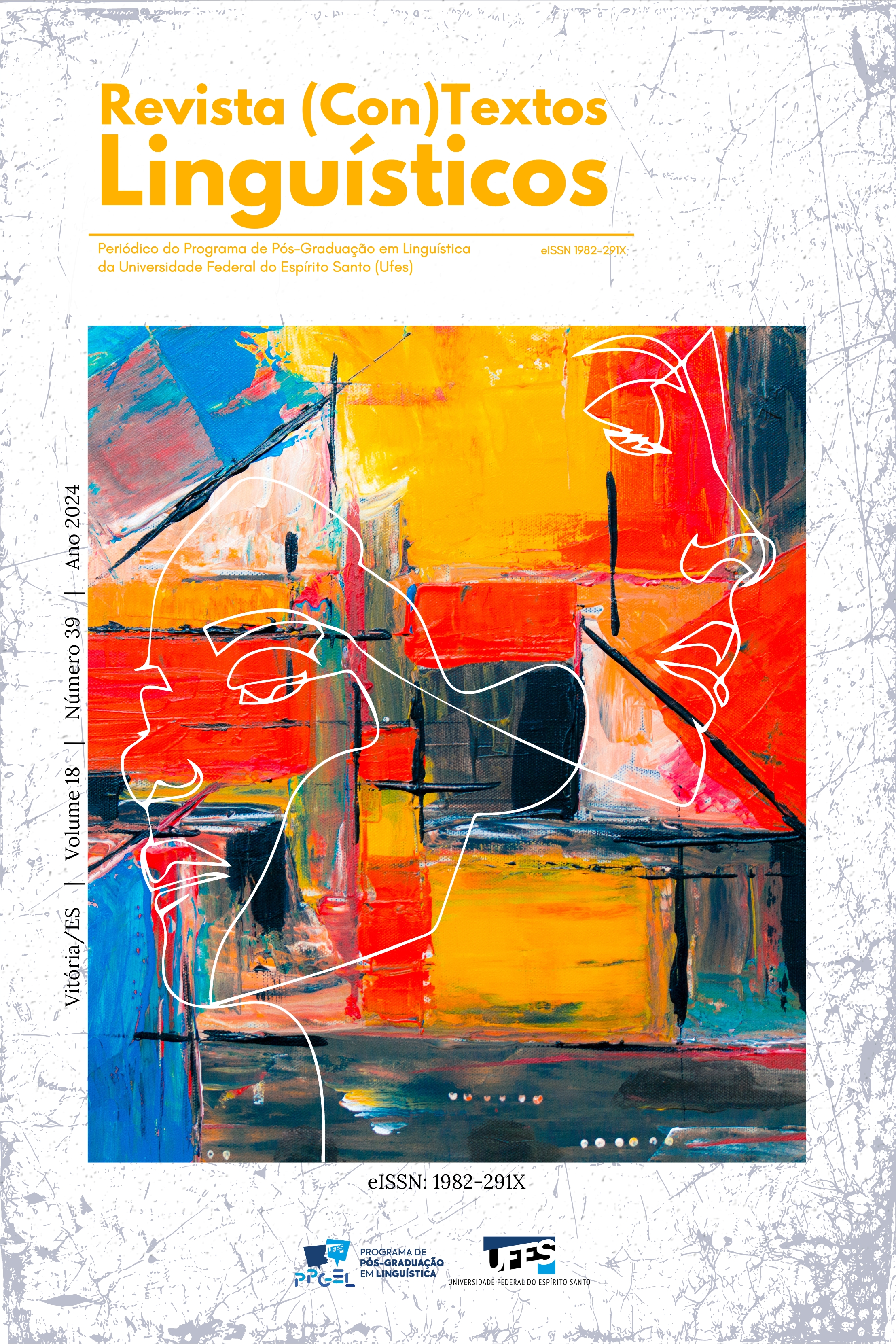A representação discursiva para a mulher negra em contos do livro Olhos d’água de Conceição Evaristo
uma análise sistêmico-funcional
DOI:
https://doi.org/10.47456/rctl.v18i39.43892Palavras-chave:
Gramática Sistêmico-Funcional, Representações Discursivas para a Mulher Negra, Olhos d’água, Conceição EvaristoResumo
Este trabalho tem por objetivo analisar as representações discursivas para a mulher negra em contos do livro Olhos d’água de Conceição Evaristo a partir do pressupostos teórico-metodológicos da Gramática Sistêmico-Funcional de Halliday e Matthiessen (2004), atentando, particularmente, para a representação discursiva no âmbito do sistema de Transitividade. Para a análise qualitativa dos dados, dividimos a pesquisa em duas etapas: análise contextual, em que verificamos o campo, as relações e o modo; e análise linguística, em que investigamos as representações para a mulher negra tendo em vista o sistema de Transitividade, o sistema de Modalização e a Estrutura Temática. Os resultados da pesquisa revelam que os processos materiais e mentais instanciam significados ligados às ações da mulher negra e aos seus sentimentos e pensamentos. Quanto à modalização, as proposições, em geral, são marcadas pelo grau alto de probabilidade, com a narradora como fonte da avaliação subjetiva explícita. No que diz respeito à articulação Tema-Rema, o Tema simples não marcado constitui o ponto de partida para a interpretação das representações discursivas da mulher negra como “forte”, “sábia”, “ancestral”, “boa”, mas, também, como uma mulher “estigmatizada”, “violentada” e “marginalizada” pelo sistema.
Downloads
Referências
HALLIDAY, M. A. K.; MATTHIESSEN, C. M. I. M. An introduction to functional Grammar. 3. ed. London: Hodder Education, 2004.
LIMA, L. O. Espelho, espelho meu, existe alguém mais doida ou santa do que eu? Representações para a mulher em crônicas de Martha Medeiros. 2015. 183 f. Dissertação (Mestrado em Letras) – Programa de Pós-Graduação em Letras, Universidade Federal de Santa Maria, Santa Maria, 2015. Disponível em: https://repositorio.ufsm.br/bitstream/handle/1/9922/LIMA%2c%20LETICIA%20OLIVEIRA%20DE.pdf?sequence=1&isAllowed=y. Acesso em: 28 fev. 2024.
MARIANO, Z.; INÁCIO, E. Estética da interseccionalidade: uma análise do conto Ana Davenga, de Conceição Evaristo. REVELL: Revista de Estudos Literários da UEMS, v. 1, n. 24, p. 466-480, 2020. Disponível em: https://periodicosonline.uems.br/index.php/REV/article/view/4818. Acesso em: 28 fev. 2024.
ROSSI, A. M. Diferentes vozes, diferentes olhares: representações para as mulheres na perspectiva sistêmico-funcional nos evangelhos. 2015. 163 f. Dissertação (Mestrado em Letras) – Programa de Pós-Graduação em Letras, Universidade de Santa Maria, Santa
Maria, 2015. Disponível em: https://repositorio.ufsm.br/handle/1/9927?show=full. Acesso em: 28 fev. 2024.
SOARES, A. Gêneros literários. São Paulo: Ática, 1993.
VENTURA, C. S. M.; LIMA-LOPES, R. E. O tema: caracterização e realização em português. Direct Papers, v. 47, p. 1-18, 2002.
Downloads
Publicado
Edição
Seção
Licença
Copyright (c) 2024 Revista (Con)Textos Linguísticos

Este trabalho está licenciado sob uma licença Creative Commons Attribution-NonCommercial 4.0 International License.
Autores cedem os direitos autorais do artigo à editora da Revista (Con)Textos Linguísticos (Programa de Pós-Graduação em Linguística da Ufes), caso a submissão seja aceita para publicação. A responsabilidade do conteúdo dos artigos é exclusiva de seus autores. É proibida a submissão integral ou parcial do texto já publicado na revista a qualquer outro periódico.
Esta obra está sob Creative Commons Attribution-NonCommercial 4.0 International License.



